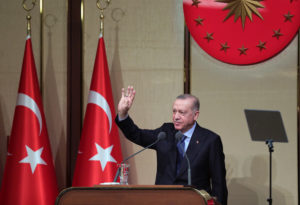Abdullah Bozkurt/Stockholm
The recent designation by the US Treasury of a Turkish-based ISIS financier reveals the failure of a crackdown on terrorist organizations by the Islamist government of President Recep Tayyip Erdoğan.
On Tuesday the Department of the Treasury’s Office of Foreign Assets Control (OFAC) designated Muhammad Dandi Adhiguna, (aka Adhiguna Lesmana Dandi), an Indonesian national who lives in Turkey’s central province of Kayseri, as a financial facilitator who helped move funds for ISIS. The designation confirms a pattern in which ISIS has been tapping the financial system in Turkey to fund its network while the authorities shy away from clamping down on ISIS cells.
The information provided by OFAC shows that ISIS is able to finance its militants and operations in the north of Syria, especially in areas where the Turkish Armed Forces (TSK) and its affiliated armed groups exert control. Similar findings were also noted by UN Security Council sanction committee reports which stated that both ISIS and al-Qaeda have managed to raise funds in areas under Turkey’s jurisdiction.
According to the OFAC designation, Adhiguna, 26, has been working closely with Dwi Dahlia Susanti, an Indonesian woman and ISIS financial facilitator. Adhiguna helped her not only in financial matters but also in operational methods. Within the triangle of Turkey, Indonesia and Syria, the two worked together in delivering cash to ISIS cells to enable family members of ISIS to move into more secure areas in Idlib, Deir ez-Zor and Raqqa as well as to recruit young men to the ranks of ISIS.
US Treasury designation of five individuals on ISIS links:
The US move came amid the 16th meeting of the Counter ISIS Finance Group (CIFG) of the Global Coalition to Defeat ISIS, a group of nearly 70 countries and international organizations led by the US, Italy and Saudi Arabia.
“Today, Treasury has taken action to expose and disrupt an international facilitation network that has supported ISIS recruitment, including the recruitment of vulnerable children in Syria,” said Under Secretary of the Treasury for Terrorism and Financial Intelligence Brian E. Nelson. “The United States, as part of the Global Coalition to Defeat ISIS, is committed to denying ISIS the ability to raise and move funds across multiple jurisdictions,” he added.
ISIS sympathizers in more than 40 countries have sent money to ISIS-linked individuals in Syria in what the US believes to be in support of ISIS’s future resurgence. The designation identified the al-Hawl displacement camp in the north of Syria where ISIS members received up to $20,000 per month, with a majority of the funding coming through Turkey. “ISIS is particularly focused on smuggling children out of displaced persons camps for recruitment as fighters,” the US noted.
Secretary of State Antony Blinken said Monday that by designating them, the Biden administration aims “to expose and disrupt an international ISIS facilitation network that has financed ISIS recruitment, including of vulnerable children in Syria.”

Kayseri, a conservative province in the heart of Turkey where Adhiguna is based, is a stronghold of the ruling Justice and Development Party (AKP), led by President Erdoğan. The province is a hotbed of radicals, from al-Qaeda to ISIS. Many who were detained as suspects in ISIS or al-Qaeda investigations were let go, leaving only a few to be formally arrested and even fewer to be indicted and convicted.
The bulk of successful ISIS convictions, already rare in the lower courts, have been thrown out by senior judges who appear to follow the lenient guidelines of the Erdoğan government when it comes to cracking down on jihadist groups.
The political pressure on judges and prosecutors who were asked to go easy on jihadists began in 2014, when the Erdoğan government started removing judges, prosecutors and police chiefs who were investigating radical groups in Turkey.
The dismissed officials were accused of links to the Gülen movement, led by Turkish Muslim cleric Fethullah Gülen, who has been an outspoken critic of the Erdoğan regime due to pervasive corruption and Turkey’s aiding and abetting of jihadist groups in Syria and Libya.
More than 130,000 civil servants have been dismissed by the government with no effective judicial or administrative investigation, 4,560 of whom were judges and prosecutors, and were replaced by pro-Erdoğan, Islamist and neo-nationalist staff. As a result of the massive purge, the Turkish judiciary and law enforcement authorities have become tools in the hands of the Islamist government of President Erdoğan and his allies.

Thousands of militants, both Turkish and foreign, have used Turkish territory to cross into Syria with the help of smugglers in order to fight alongside ISIS groups there. Turkish intelligence agency MIT (Milli İstihbarat Teşkilatı) has facilitated their travel, with Kilis, a border province in Turkey’s Southeast, one of the main crossing points into ISIS-held territory. Human smugglers were known to have been active in the border area, although Turkish authorities often overlooked their trips in and out of Syria.
There have been some cases, however, in which ISIS suspects were detained and indicted on terrorism charges. But very few resulted in convictions in the lower courts. The decision of Turkey’s Supreme Court of Appeals to overturn rare cases of conviction of suspects on ISIS terrorism charges set an important precedent in Turkey’s criminal justice system. The ruling will effectively render to zero the chances of convicting an ISIS member on terrorism charges in the lower courts.
Turkish officials do not disclose the number of successful convictions in ISIS cases and decline to respond to parliamentary questions asking for such information. Instead, they often float figures on the number of detentions and arrests, which in many cases result in release and acquittal.
Erdoğan announced on October 10, 2019 that there were around 5,500 ISIS terrorists in Turkish prisons, of which half were foreign nationals. Yet, on October 25, 2019 then-Justice Minister Abdülhamit Gül stated at a press conference that there were 1,163 ISIS arrestees and convicts in prison.
Responding to a parliamentary question on July 21, 2020, Gül said 1,195 ISIS members were in prison either as convicts or suspects in pretrial detention. Of these, 791 were foreign nationals, he added. He declined to say how many had actually been convicted.
Interior Minister Suleyman Soylu told lawmakers in parliament in November 2021 that law enforcement agencies conducted 1,173 operations against ISIS in 2021, detaining 2,438 suspects. Only 487 of them were formally arrested by courts. He did not give the number of convictions.












